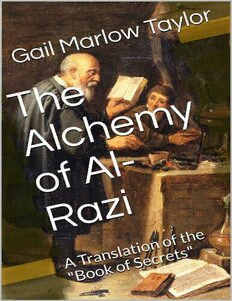
The Alchemy of Al-Razi: A Translation of the "Book of Secrets" PDF
Preview The Alchemy of Al-Razi: A Translation of the "Book of Secrets"
T H E A L C H E M Y O F A L - R A Z I A Translation of the “Book of Secrets” Gail Marlow Taylor Copyright © 2014 by Gail Marlow Taylor. All Rights Reserved. ABOUT THE AUTHOR Gail Marlow Taylor began her graduate studies in history following a 25-year career in laboratory medicine. She completed her master’s degree in 2008 with a thesis entitled: “Al-Razi's Book of Secrets: The Practical Laboratory in the Medieval Islamic World.” This analysis, which included her English translation of the Book of Secrets, won the 2009 Outstanding Thesis Award at California State University, Fullerton. In June, 2014, she was awarded a doctorate in history at University of California, Irvine. Her dissertation analyzed the reception of New World medicinal plants in sixteenth-century Germany, and included a year of research in Wolfenbüttel on a Fulbright Scholarship. She lives in Rancho Santa Margarita, California, where she enjoys spending time with her children and grandchildren and writing her blog, “History’s Edge.” ABOUT THE COVER PHOTOGRAPH Because complicated alchemical procedures required written instructions, books have become an iconic part of alchemy in artistic representations. In this seventeenth-century painting, the alchemist stirs the crucible with book in hand, while assistants prepare ingredients and monitor the critical level of heat. Detail from The Bald-Headed Alchemist, after David Teniers II, Fisher Collection. (Courtesy of the Chemical Heritage Foundation Collections. Photo by Will Brown. 00.01.258.) ACKNOWLEDGEMENTS Heartfelt thanks are due to two people who helped me see this project as living history: Father Jose Luis de Valle Merino at the Real Biblioteca Monasterio del Escorial, who let me hold the Escorial manuscript of the Kitāb al-Asrār in my hands and scanned in a digital copy for me to take home, and Thomas Ruska in Berlin, who graciously gave me permission to use Julius Ruska’s translation of al-Rāzī’s work and invited me to contribute a printed copy of my translation to the archive of his great grandfather’s distinguished works. The book itself owes its existence to the many readers who read about my thesis and translation in my blog and asked me where they could find a copy. Hearing from people in ten different countries and from a variety of backgrounds served as both an inspiration and a testament to the enduring interest in al-Razi and his contributions to chemistry. I am more than grateful for the encouragement and support of my thesis advisor at California State University, Fullerton, Dr. Jochen Burgtorf, and my thesis committee members Dr. Nancy Fitch and Dr. Lynn Sargeant, who received my prospectus with such contagious enthusiasm. A big measure of thanks goes to my doctoral advisors at University of California, Irvine, Dr. Ulrike Strasser and Dr. Laura Mitchell, who urged me to follow through and publish this work. My friends and colleagues throughout my hospital career not only unwittingly shaped my laboratory persona, but even read parts of this book, making it almost a laboratory result in itself. Of course, any failures to meet quality control standards are purely my own. As for the unfailing love of my father, my children, my grandchildren, and especially my husband, a tireless and expert proofreader, words cannot express my gratitude for your patience with the hours I have spent in al-Rāzī’s laboratory. “Alchemy was never at any time anything different from chemistry. It is utterly unjust to confound it, as is generally done, with the gold-making of the sixteenth and seventeenth centuries. . . . Alchemy was a science, and included all those processes in which chemistry was technically applied.” —JUSTUS VON LIEBIG FAMILIAR LETTERS ON CHEMISTRY LONDON, 1859, 54. TABLE OF CONTENTS About the Author About the cover photograph ACKNOWLEDGEMENTS PREFACE INTRODUCTION The Laboratory and the Book Sources and Structure Alchemy and Chemistry The Kitāb al-Asrār IN HISTORY The Durability of the Practical Laboratory Manual Abū Bakr Muhammad ibn Zakarīyā al-Rāzī: Also Known as Rhazes The Kitāb al-Asrār: The Secret is Out INSIDE the Kitāb al-Asrār The Laboratory’s Role in Transition Sine Qua Non: The Hidden Assumptions Physical Requirements: Chemicals and Equipment Operational Requirements: Clear, Realistic, and Safe Procedures Verification Requirements: The Key to Reproducibility Time and Temperature Weights and Measures End Points CONCLUSION The translation of the Kitāb al-Asrār KITĀB AL-ASRĀR: Outline THE BOOK SECRET OF SECRETS BIBLIOGRAPHY Primary Sources Secondary Sources PREFACE Over a thousand years ago, the Persian physician and alchemist Abu Bakr Muhammad ibn Zakariya al-Razi presented his students with a book of alchemy instructions called the Kitab al- Asrar or Book of Secrets. For over seven hundred years this systematic text on managing chemicals, equipment, and procedures was translated and imitated throughout Europe. Using historian Julius Ruska’s authoritative 1937 German translation, I have translated al-Razi’s Book of Secrets into English for the first time and analyzed it from the practical hands-on perspective of my own laboratory experience. With its promises of gold and prolonging life, alchemy has long attracted scholars, kings, and charlatans while over the centuries the practice of material transformation undertaken in this quest laid a foundation for the chemistry, metallurgy, and medical laboratory techniques of our times. From the tenth century, the Kitab al-Asrar or Book of Secrets of al-Razi speaks to us of the instruments, measurements, and reproducibility that are the essence of laboratory practice today. As a laboratory technologist, I recognized the structure and procedures Book of Secrets to be those of a laboratory manual, much as we see in any chemistry laboratory class. I based the argument of my master’s thesis on this similarity, calling it: Al-Razi’s Book of Secrets: The Practical Laboratory in the Medieval Islamic World. This thesis, which includes my English translation of the
